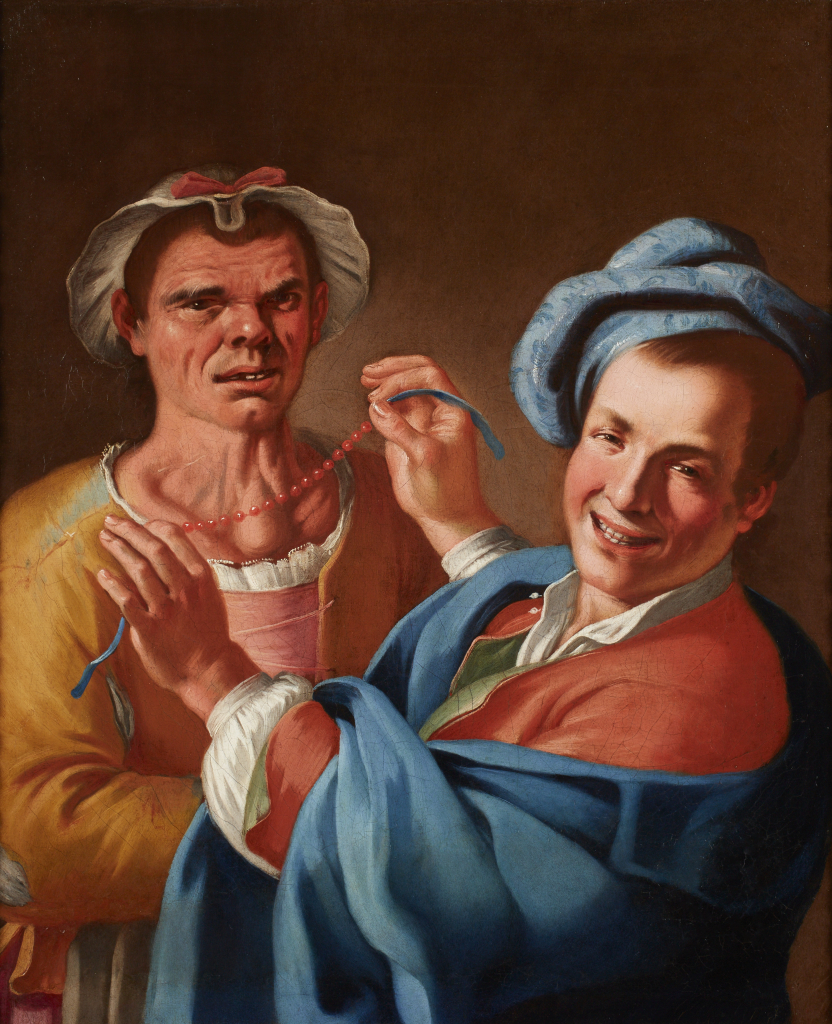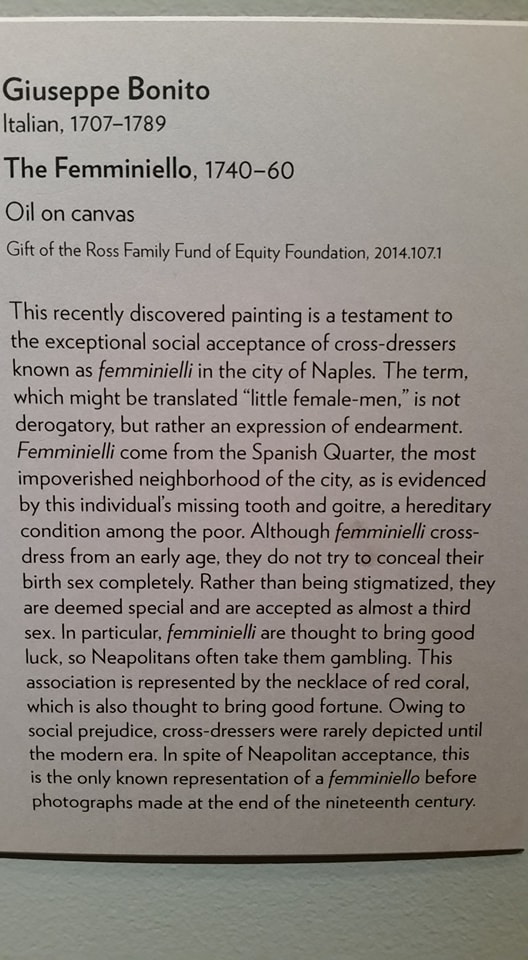Il Femminiello, Portland Art Museum Online Collections page
Gift of the Ross Family Fund of Equity Foundation, in 2014.
The description on the Sotheby's auction catalog was:
CATALOGUE NOTEThe museum's description, which is online and on a placard by the painting, isThis extraordinary painting is a rare, 18th century depiction of a femminiello (cross dressed male), capturing a glimpse of a fascinating subculture that is entrenched in Neapolitan history.1 These men were usually the youngest child of impoverished families, and would be brought up as a femminiello and dressed as women from a young age. They were often uneducated, illiterate and coddled by their mothers. Femminielli, while the subject of much amusement, were met with good humor rather than derision and were accepted almost as a third sex. They were embraced by their neighbors in the backstreet viali of Naples and were entrusted by all with the care of children and household duties and errands. In Naples, still today, the tradition of the femminiello remains strong and secret rites are performed for these cross dressing men, viewed entirely seperately from more modern transvestite communities.
This painting will be included in a forthcoming Giuseppe Bonito monograph compiled by Achille della Ragione.
1. A. della Ragione, "I Femminielli", in Guide Campania, Campania (online version).
This recently discovered painting is a testament to the exceptional social acceptance of cross-dressers known as femminielli in the city of Naples. The term, which might be translated "little female-men," is not derogatory, but rather an expression of endearment. Femminielli come from the Spanish Quarter, the most impoverished neighborhood of the city, as is evidenced by this individual's missing tooth and goitre, a hereditary condition among the poor. Although femminielli crossdress from an early age, they do not try to conceal their birth sex completely. Rather than being stigmatized, they are deemed special and are accepted as almost a third sex. In particular, femminielli are thought to bring good luck, so Neapolitans often take them gambling. This association is represented by the necklace of red coral, which is also thought to bring good fortune. Owing to social prejudice, cross-dressers were rarely depicted until the modern era. In spite of Neapolitan acceptance, this is the only known representation of a femminiello before photographs made at the end of the nineteenth century.
The museum's description is badly written and seems filled with questionable assertions. It changes from past tense to present.
I couldn't find "the Ross Family Fund of Equity Foundation," but I guess it's a subset of this money: Equity Foundation. Now that has been subsumed into Pride Foundation, according to this: http://www.equityfoundation.org.
The painting was bought for $15,000 in 2014, and donated to the museum.
I found an article talking about the painting. It credits a museum employee with discovering it, but doesn't talk about how it was obtained. Also, that employee "cautions against looking at 'Il Femminiello' as representative of any kind of early notion of trans acceptance." Unfortunately, others involved are grabbing it and running with it.
This 18th-Century Italian Painting Proves Gender Nonconformity Is Far From a Modern Invention
The article is about finding enough history that can be called transgender evidence to make the present easier. One example given, though, was men playing female parts in Shakespeare plays. Out of context of the law against women being onstage, it might look like men wanted to play those parts, but that was not the situation.
There are other things in the article that are of questionable value.

People Trust Museums More Than Newspapers. Here Is Why That Matters Right Now (DATA), Colleen Dilenschneider, April 2017. This writing goes from the trust people have in museums, aquariums and zoos, into the expectation that museums will tell people what to do, and the political realities of those expectations.
Transgender index page
 Links and commentary (originating in an unschooling forum)
Links and commentary (originating in an unschooling forum)
 Public facebook group
(if it's still there)
Public facebook group
(if it's still there)

